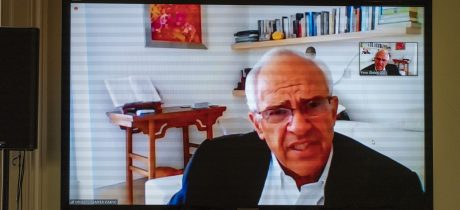NEW YORK. – Former Chilean President Ricardo Lagos suggested an agreement between the governments of Latin American and Caribbean countries to jointly face, with greater possibilities of success, the multiple problems that the region is facing.
“There must be coordination so that we in the region speak the same language,” Lagos said, during remarks delivered at the Global Forum on Latin America and the Caribbean 2021, held today, September 24, in New York City.
In that sense, Lagos referred to the role played by Brazil, Mexico and Argentina, the only Latin American countries that are part of the G-20.
“It is important to understand, as Latin Americans, that we must defend the interests of our region and our hemisphere,” he said.
The former Chilean president said that a path must be found so that the investments made in the different countries of the region can meet the objectives of sustainable development.
Also at the event, former Colombian President Ernesto Samper considered it worrisome that there has been no solidarity response from the world to the global challenge generated by the Covid-19 pandemic.
“We have faced strong health protectionism, and limitations on the export of medicines and vaccines,” he said.
According to the former Colombian President, the solution to the regional problem must be oriented to have vaccines declared to be universal goods. He also stated that “the game cannot be won by pharmaceutical companies, but solutions must be sought forward, to establish a minimum of solidarity.”
Samper pointed out that the Covid-19 pandemic has been the first global crisis of the 21st century, comparable in its effects with the Great Depression of the 1930s.
Meanwhile, Luis Almagro, Secretary General of the Organization of American States (OAS), said that working together is the key to successfully face the multiple problems of the region, which have been aggravated by the pandemic.
He maintained that the Covid-19 crisis has challenged the strength of democracy in the region, making it necessary to design and execute a set of actions with a view that is capable of addressing the situation.
“We have to face these challenges in order to achieve the development of the countries of the region” Almagro said, after highlighting the role played by the OAS as an organization that articulates common initiatives in the hemisphere.
The panel was also attended by Sergio Abreu, Secretary General of the Latin American Integration Association (ALADI), who emphasized the issue of regional integration as a way to solve the common problems of Latin America and the Caribbean.
“Integration is achieved with the political will of governments,” Abreu said.
He said that many governments in the region, in order to win the elections, are giving greater importance to short-term policies, thus mortgaging the future of new and future generations.
For his part, Marco Pinta Gama, Ibero-American Assistant Secretary, advocated for a post-Covid recovery agenda, covering all aspects of the crisis.
In that sense, Pinta Gama asked international financial organizations to take into account middle-income countries, so that they can face the problems of the pandemic.
“We face a great challenge regarding how cooperation should be implemented to respond to the problem,” he said.
The former president of Costa Rica, Laura Chinchilla, warned that the Latin American and Caribbean regions are losing a lot of space at the international level, an element that must be urgently addressed.
According to the former Central American leader, this situation is due to the scarce contribution the region makes to the global economy, despite the great potential it has in that regard.
In analyzing the political landscape, Chinchilla stressed the importance of maintaining the validity of the regional integration mechanisms. She also recommended that attention be paid to the migration crisis and the situation that currently prevails in Nicaragua.



